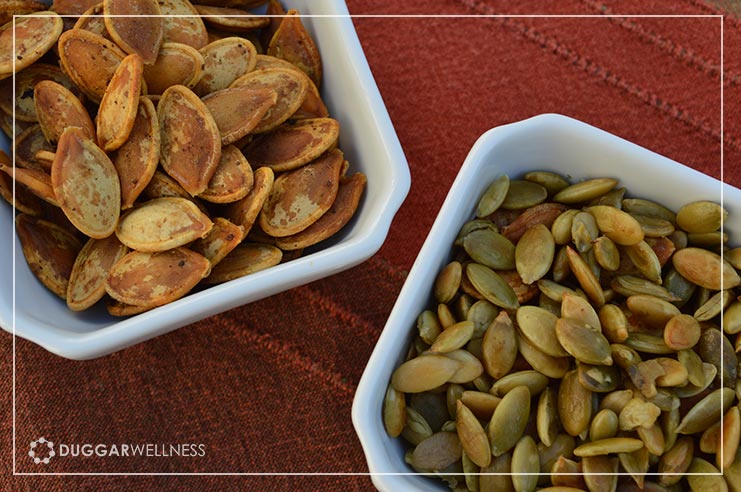During the harvest months pumpkins make their way into soups, salad, pies, muffins, cookies and even scary decorations. Aside from being so versatile this seasonal food has many potent nutritional properties.
Fun Pumpkin Facts:
- Pumpkins originated in Central America.
- Native Americans used pumpkin seeds for food and medicine.
- Today 1.1 billion pounds of pumpkin s are grown every year in the United States.
- Pumpkin flowers are edible.
- Pumpkins are a fruit.
- Pumpkin seeds can be eaten whole or the outer coating can be hulled.
6 Amazing Health Benefits of Pumpkins:
Pumpkins, like other winter squash varieties are loaded with nutrients.
1. Pumpkins help boost immunity to keep you well
Both pumpkin flesh and seeds are high in vitamin C and antioxidants, including beta-carotene and other carotenoids.
In fact, pumpkin is one of the best sources of beta-carotene and the other synergistic carotenoids. Together, they give pumpkins their bright, eye-catching color.
Beta-carotene is good for your immune system because it’s converted into vitamin A, triggering the creation of white blood cells, which fight infection and help keep you well.
2. Pumpkins help keep your eyes healthy
Beta-carotene supports eye health, according to the National Institutes of Health, a cup of cooked pumpkin contains more than 200% of your recommended daily intake of vitamin A — which aids vision, particularly in dim light.
In addition to their immune benefits, beta-carotene and the other carotenoids, including lutein, are important for eye health.
Some of the other antioxidants found in pumpkin that can help you prevent degenerative damage to your eyes include lutein and alpha-carotene. Lutein is known to improve or even prevent age-related macular disease which is the leading cause of blindness and vision impairment and alpha-carotene is thought to reduce the risk of developing cataracts.
3. Pumpkins are a heart-healthy choice
The potassium in pumpkins can have a positive effect on blood pressure.
A 2017 study published in “Nutrition, Metabolism and Cardiovascular Diseases” suggests that consuming enough potassium may be almost as important as decreasing sodium (salt) intake for treating high blood pressure.
Another study showed how participants with the highest amount of beta-carotene had approximately half the risk of death from cardiovascular disease compared to those with the lowest amount.
The soluble fiber in pumpkin is also useful for lowering cholesterol and triglycerides.
4. Pumpkins can help prevent cancer
Pumpkins are packed with antioxidants, and eating them often may help reduce the risk of many types of cancer.
Specifically, according to the National Cancer Institute, the beta-carotene in pumpkins may play a role in cancer prevention.
And as the NIH discovered, food sources of beta-carotene work far better than supplements, particularly when the food sources contain the full range of carotenoids.
5. Pumpkins can help treat type 2 diabetes and lower blood sugar
Eating pumpkin can have a variety of beneficial effects for diabetics — and for lowering blood sugar.
A 2009 study published in “Bioscience, Biotechnology, and Biochemistry,” found that substances in pumpkin may help improve insulin resistance and slow the progression of diabetes.
Multiple studies, including a 2007 study published in the “Journal of Medicinal Food” and a 2005 study published in “Plant Foods for Human Nutrition,” have demonstrated how substances in pumpkin can lower blood sugar levels.
6. Pumpkins can help reduce inflammation and the risk of arthritis
Regular intake of the carotenoid beta-cryptoxanthin, which is found in pumpkin, can cool unwanted inflammation.
A study also showed how increasing consumption of this carotenoid is associated with a reduced risk of developing inflammatory disorders, such as rheumatoid arthritis.
 160 N Main, Bountiful, UT 84010
160 N Main, Bountiful, UT 84010  801-677-7878
801-677-7878





One response to “Power of Pumpkins”
[…] brings with it a wealth of nutrient dense winter squash. Some varieties include: Pumpkin, Acorn, Butternut, Hubbard and Spaghetti. These beautifully colored squash are rich in […]